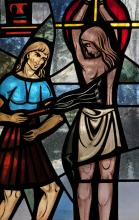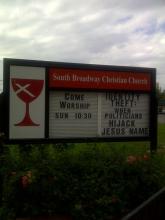Jesus

How do we find a job? How do we find work? Maybe we shouldn't worry so much...LEAN into what feeds you.
Get out beyond the castle walls. The Kingdom of God is not a castle. It's a kingdom.
Sometimes it is our friends who remind us there is this kingdom and there is this Christ...
And a lot for "The Nones" to chew on here, too.
See the latest Busted Stuff video inside...

 Editor's Note: Kevin Gonzaga tells his story of why he's part of the 20 percent of Americans who identify with "no religion in particular." Find more stories (or share your own) HERE. Read about the study HERE.
Editor's Note: Kevin Gonzaga tells his story of why he's part of the 20 percent of Americans who identify with "no religion in particular." Find more stories (or share your own) HERE. Read about the study HERE.
Three years ago when I arrived at seminary to pursue my calling to fulltime pastoral ministry, one would probably have struggled to find someone in my generation more committed to the ministry and vitality of the local church.
While imperfect, I believed the church was the best hope of the world, and it was better to stay and work toward change than abandon the church and look for greener pastures. A year and a half later, I wrote a blog post explaining that I was no longer a Christian. I fear that this would only deepen the stereotype that seminary is a place where people lose their faith, so I should explain.
The truth is I am one of growing number of people who choose not to affiliate with any organized religion. I am a “none,” and my journey to “none” started a long before I left for seminary. My disillusionment with, and eventual abandonment of, Christianity did not center around one traumatic event that shattered my faith, but rather it was something that coalesced from numerous experiences over a long time.
It really started when I began studying the scriptures for myself in college. I was shocked to find many things I had been taught by the Church were wrong, were not in the Bible, or were even contrary to what the scriptures actually taught.

Writing books is a strange process. When you’re in the middle of creating something this big, it tends to consume your every waking moment in some way. I can’t watch TV or have a conversation with a neighbor without my mind searching the content for narrative or thematic threads to weave into the chapter I’m working on. It can be a little bit maddening, at least for those around us, I expect. But I love it.
One unlikely wonderful source for material as of late for me has been the show “Louie,” by comedian Louis C.K. To say he’s irreverent would be underselling his shock value. He’s a little bit like Trey Parker and Matt Stone of South Park fame in that he levels the playing field of propriety simply by making nothing off limits. Some might not be able to get past his coarse and occasionally nihilistic approach to life, but I consider him to be nothing short of prophetic in his observations about the human condition.

In 2009, after moving to Southern California, a neighbor, Tom Rotert, who is an attorney, asked about my reporting on wrongful convictions and wrongful executions while I was at the Chicago Tribune.
I explained that along with my fellow reporter Steve Mills, we had documented numerous wrongful convictions in Illinois and the executions of two innocent men in Texas — Carlos DeLuna and Cameron Todd Willingham.
“You know who the ultimate wrongful execution is, don’t you?” Rotert asked. “It was Jesus Christ. They killed the son of God.”
The crucifixion of Jesus Christ doesn’t come up very often in discussions about wrongful convictions in America, but as California voters prepare to go to the polls to vote on Proposition 34 which would ban the death penalty in this state, two lawyers — one from Chicago and one from Minneapolis — are doing exactly that.

WASHINGTON — Most Americans do not believe Scientology is a real religion, according to a recent poll by 60 Minutes and Vanity Fair.
The survey, conducted by CBS News, found that 70 percent of Americans say that Scientology is not a true religion; 13 percent believe it is; and 18 percent either don’t know or don’t care.
Out of the more than 1,000 people polled, Christian Americans were even more likely to question Scientology’s status as a religion — 79 percent of evangelicals, 74 percent of Protestants and 72 percent of Catholics surveyed responded that they did not think Scientology is a religion.
L. Ron Hubbard, a science fiction author, established Scientology in 1952, and the Church of Scientology has been acknowledged as a religion in the United States since 1993. Scientology is known for its celebrity followers, such as actors Tom Cruise and John Travolta.

It seems like the Bible is the one piece of real estate Donald Trump is unfamiliar with. Or maybe he’s just never read any of that “Jesus” stuff in the New Testament.
Last Monday, the Donald told Liberty University students not to turn the other cheek but to "get even" with adversaries, particularly in business.
"I always say don't let people take advantage — this goes for a country, too, by the way — don't let people take advantage,” Trump said. “Get even. And you know, if nothing else, others will see that and they're going to say, 'You know, I'm going to let Jim Smith or Sarah Malone, I'm going to let them alone because they're tough customers."

The Vatican's newspaper has declared the controversial “Jesus wife” papyrus fragment “a fake."
L'Osservatore Romano on Friday (Sept. 28) devoted two articles to Harvard professor Karen King's claim that a 4th century Coptic papyrus fragment showed that some early Christians believed that Jesus was married.
The announcement of the discovery on Sept. 18 made headlines worldwide but was met with skepticism by scholars who questioned the authenticity of the fragment.
In the Vatican daily, a detailed and critical analysis of King's research by leading Coptic scholar Alberto Camplani is accompanied by a punchy column by the newspaper’s editor, Giovanni Maria Vian, who is a historian of early Christianity.
Vian writes that there are “considerable reasons” to think that the fragment is nothing more than a “clumsy fake.” Moreover, according to Vian, King's interpretation of its content is “wholly implausible” and bends the facts to suit “a contemporary ideology which has nothing to do with ancient Christian history, or with the figure of Jesus”.
“At any rate, it's a fake,” he concludes.

Can Tim Tebow do no wrong?
Michael Butterworth of Bowling Green State University has turned his attention to sports media coverage of Tebow, an evangelical Christian and New York Jets quarterback. The author of a forthcoming article in the journal of the National Communication Association, Butterworth talked about how Tebow coverage seldom treads beyond a “nice guy” image to delve into his faith.
Some answers have been edited for length and clarity.

It’s amazing what a difference six words can make in our understanding of a figure as central as Jesus to the lives and faith of so many. Even historians and others who don’t claim Christianity personally are intrigued by the scrap of text recently discovered to contain, in Coptic, the sentence fragment: “Jesus said to them, ‘My wife…’”
Was this Jesus of Nazareth? is it authentic? Did the author have an original source to pull from, or simply word-of-mouth legend? After all, this writing seems to be several hundred years newer than the synoptic gospels. Perhaps Jesus was speaking in parable, as he often did, or maybe the “wife” was the Church, which often is referred to as “the bride of Christ.” Who knows? It’s likely we never will, but the buzz that this find creates is more interesting to me than the source of the scripture itself.
Why do we care so much if Jesus had a wife and kids or not? Why does it seem to matter if he died without ever having sex?

In a surprise announcement that seemed scripted by the novelist Dan Brown, a Harvard professor revealed an ancient scrap of papyrus on Tuesday (Sept. 18) that purports to refer to Jesus' wife.
The so-called "Gospel of Jesus' Wife" presents a dialogue between Jesus and his disciples, said Karen King, a well-respected historian of early Christianity at Harvard Divinity School.
The fourth-century fragment says, "Jesus said to them, 'My wife ...,'" according to King. The rest of the sentence is cut off. The fragment also says "she will be able to be my disciple," according to King.
The discovery that some ancient Christians thought Jesus had a wife could shake up centuries-old Christian traditions, King suggested.
But even King acknowledged that questions remain about the receipt-sized scrap, which contains just 33 words and incomplete sentences. Here are five of the biggest questions.
Dan Brown, your phone is ringing.
A newly revealed piece of papyrus offers fresh evidence that some early Christians believed Jesus was married, according to a Harvard Divinity School professor.
A fourth-century codex in Coptic quotes Jesus referring to “my wife,” Karen King, a scholar of early Christianity, said on Tuesday. It is the only extant text in which Jesus is explicitly portrayed as betrothed, according to King.
King is calling the receipt-sized slip of papyrus “The Gospel of Jesus’ Wife.” She believes it was originally written in Greek, and later translated into Coptic, an Egyptian language.
The fragment says, "Jesus said to them, 'My wife...,'" according to King. The rest of the sentence is cut off. Another segment says, "As for me, I dwell with her in order to..." The speaker is not named.
The fragment contains just 33 words spread across 14 incomplete lines—less a full-fledged gospel than an ancient crossword puzzle.

Gotta say I’m a big fan of this church sign at my father-in-law’s church.
It’s time to STOP:
- Using faith, Jesus, and the Bible as a political platform;
- Cherry-picking from the Gospel based on what polls well;
- Claiming Jesus would be so myopic to identify with either of our major political parties;
...

I was watching this recent video where Tim Keller (along with Don Carson and John Piper) addresses why The Gospel Coalition is explicitly complementarian (a nice way to say that they don't believe in gender equality). Why do they see this as something that a group that is supposed to be focused on the Gospel would need to stress?
Keller begins by saying that he does not think the issue of gender roles are directly part of the Gospel, and acknowledges that bringing it up in the context of answering a person's questions of what it would mean to be a Christian could "certainly muddy the waters."
So why the focus then? He says it has to do with how we read Scripture.

Jesus said to them, Very truly, I tell you, whoever believes has eternal life. I am the bread of life. - John 6:47-48
When I was in my 20s and totally out of control and pretty much estranged from my conservative Christian parents I used to joke about how my mom would try and guilt me into connecting with them more often by saying in her Kentucky accent “Nadia, the least you could do is come visit us more often … since we won’t be spending eternity together." Which made me wonder if the church she went to realized that the promise of spending eternity with my mom and her friends wasn’t exactly the best-selling point. At least not for a 21 year old.*
But that’s kind of what I was taught: that being a Christian was all about where you will spend eternity after you die – kind of like purchasing a life-insurance plan for the hereafter. And if you manage to be good enough here on earth then when you die you get to go to heaven and be like the spiritual 1 percent for eternity and live in big mansions with Jesus and wear awesome jewels and walk streets of gold.
Which made it sound like eternal life is basically about getting to live like Liberace Forever.

Tony Jones has asked some of us progressive Theobloggers to chime in on God, you know, perhaps some kind of definition or doctrine (that word many of us progressives despise). You can read his invitation here. Tony doesn't want us to talk about Jesus, per se, but about God. I get that. He's in his evangelical context and he gets tired of all the Jesus talk. Lately it seems that the Emergent conversation has been all Jesus all the time. Now, that doesn't bother me, but then again I feel that in my end of the progressive mainline (free church progressive) we don't talk about Jesus enough. We talk about God all the time. Jesus, well, he's a bit of an enigma. What else is there to say? Nevertheless, Tony's invitation is an interesting one and I'm willing to chime in.
One caveat: I'm doing this as a way to speak of one Person of a Trinity. To speak of the One is, in many ways, to speak of the Three and the Unity. But this is just a blog post and not a 20-page essay. So ... yeah.
My answer: If you want to know God, get Religion. (Have you got good religion? Certainly, Lord!) Religion is a combined set of activities embodied by people. These activities are not limited to but may include the following behaviors: liturgy, charity, politics, and even theology (mystical and systematic), and doctrine. Religion can be communal or individual. Religion is the principal craft by which we know (cognition) and understand (hermeneutics) God.

Michael Phelps was accomplishing things no one in recorded history has ever done before. I can’t explain or really comprehend how he can do it. And although he did them, I attribute his physiology and gifts to God. So is what he does in the Olympics a miracle?
It almost seems that we worship him as if they were miraculous acts. We literally put him up on a pedestal and adore him, much like how people adored Jesus. And just like with Jesus, these amazing feats, whether or not they are literally miraculous acts, are simply not enough. The fall will inevitably come.
If they were, Jesus wouldn’t have been abandoned at his most vulnerable moment. Some will argue that he saved the biggest and best for last, raising from the dead, which finally put all of his doubters in their place. Really? Then why are our numbers, at least in the Western World, in such precipitous decline?

Of course, there’s a part of all of us that loves a winner. There’s a reason why so many people wear the jerseys of their favorite teams or players (way more when that person or team is on top than not, by the way), why we revert to a sort of tribal level of passion — painting our faces, screaming rabidly — and why we practically make a religion out of our sports. At one level, it’s inspiring to see someone achieve what appears to be unattainable. The idea of doing what most Olympians do — or all professional athletes, for that matter — is hard to comprehend. But when we get to witness it, it serves to embolden our faith in humanity a little bit.
Yes, we screw up a lot, we fight each other, and we’re warming up the planet at an alarming rate. But once in a while, it’s transcendent to watch someone do something amazing, beautiful, a little bit closer to perfect.

Editor's Note: The following is a question from Christian Piatt's book Banned Questions About Jesus. It is on sale on Amazon Kindle for $2.99 through July 25.
Jarrod McKenna: No.
Jesus did not come to bring peace but a sword. And we as disciples must wield the same sword Jesus brings, and no other.
The question is, what is this sword?
What is this sword that heals rather than harms enemies?
What is this sword that never collaborates or mirrors the Powers, thereby exposing their addiction to violence?
What is this sword that prophetically turns over tables of idolatry and injustice in a judgment that does not harm, hurt, coerce or kill anyone?
What is this fire that is ablaze with the very presence of I AM in response to the cries of the oppressed, this fire that does not destroy the bush in which it burns?
What is this power that is ablaze on the cross, sucking the oxygen of injustice and violence from creation then causes a cosmic backdraft in the resurrection, setting the world alight with the love that conquers death?

Back in 2005, Africa was a recurring theme of U2's worldwide Vertigo tour, where Bono’s campaigning for debt relief, trade justice and immediate intervention in the AIDS pandemic — each fueled by his following of Jesus — met in his music in indelibly powerful collision of faith, justice, and art.
When Bono and his bandmates played “Where The Streets Have No Name,” the most amazing mass of colors dropped from the rafters as millions of Willie Williams-designed, light bulbs descended from the rafters to form stage’s back drop and a modern-mosaic high-tech screen. Then came the flags of each African nation in the most moving light show I’ve ever seen.
During the razzle-dazzle on stage, Bono made his claim,
“From the swamp lands of Louisiana to the high hills of Kilimanjaro, from the bridge at Selma to the mouth of the Nile…AFRICA…AFRICA…AFRICA…the
journey of equality moves on, moves on…AFRICA…from town centers to townships…sacred ground, proving ground…”
The link between the Martin Luther King Jr. (the Doctor of the Deep South of America’s inequality) to Desmond Tutu and Nelson Mandela (the Archbishop and President of Africa’s inequality) was particularly potent art.

In recent days, conservatives have attacked the Episcopal Church. The reason? The church has just concluded its once every three-year national meeting, and in this gathering the denomination affirmed a liturgy to bless same-sex unions. Conservatives assert that the Episcopal Church's ever-increasing social and political progressivism has led to a precipitous membership decline and ruined the denomination.
Many of the criticisms were mean-spirited or partisan, continuing a decade-long internal debate about the Episcopal Church's future. However, New York Times columnist Ross Douthat broadened the discussion, moving beyond inside-baseball ecclesial politics to ask a larger question: "Can Liberal Christianity be Saved?"
The question is a good one, for the liberal Christian tradition is an important part of American culture, from dazzling literary and intellectual achievements to great social reform movements. Mr. Douthat recognizes these contributions and rightly praises this aspect of liberal Christianity as "an immensely positive force in our national life."
Despite this history, however, Mr. Douthat insists that any denomination committed to contemporary liberalism will ultimately collapse. According to him, the Episcopal Church and its allegedly trendy faith, a faith that varies from a more worthy form of classical liberalism, is facing imminent death.